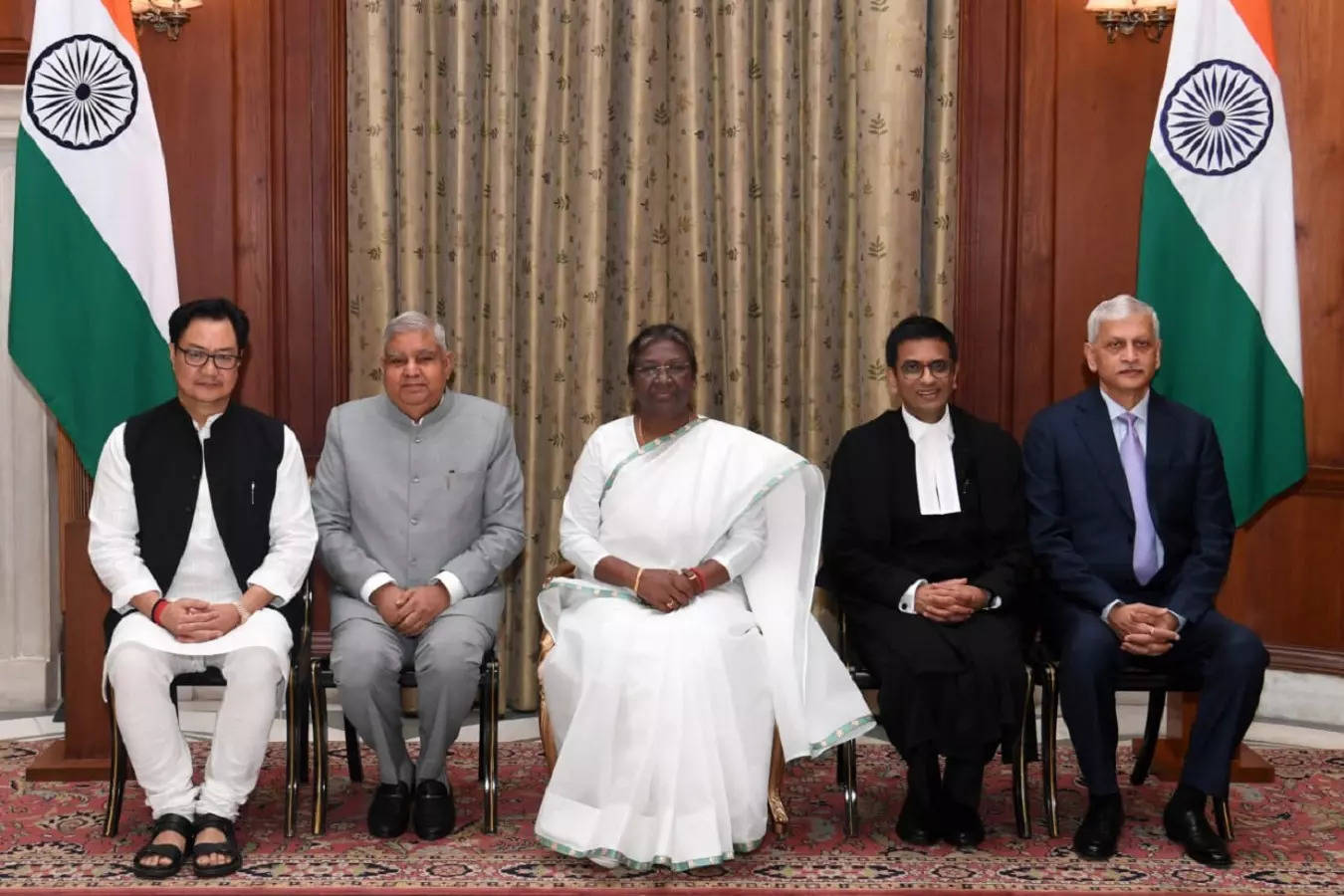


Supreme Court Chief Justice of India DY Chandrachud shared his experiences working on the controversial Ayodhya-Babri Masjid dispute case, stating that it was a difficult case to adjudicate. He revealed that he even prayed to God to help find a solution. This statement was made during his address to a gathering in a village in Khed taluka. Soon after, the 5-judge bench, led by Justice Chandrachud, delivered the verdict in November 2019, allowing the construction of a Ram Temple on the disputed site. The judge also mentioned that regular prayers and faith can lead to finding a solution in challenging cases.
Chief Justice of India Ayodhya Ram Janmabhoomi Babri Masjid Case
The Ayodhya-Babri Masjid dispute, a highly contentious religious and historical issue in India, centered around a site in Ayodhya believed to be the birthplace of Lord Rama, the revered Hindu deity. The site had been the subject of a long-standing dispute between Hindu and Muslim communities, each claiming religious ownership.
Supreme Court Verdict
In November 2019, a 5-judge bench of the Supreme Court of India, led by then-Chief Justice of India Ranjan Gogoi, delivered a historic verdict in the Ayodhya case. The bench ruled in favor of the Hindu plaintiffs, allowing the construction of a Ram Temple on the disputed site.
Chief Justice's Experience
In a recent address, the current Chief Justice of India, Dhananjaya Y. Chandrachud, who was a member of the 5-judge bench, shared his experiences working on the case. He described it as a difficult case to adjudicate, requiring careful consideration of historical, religious, and legal perspectives.
Chandrachud revealed that during the deliberations, he prayed to God for guidance in finding a solution. He emphasized the importance of faith and regular prayers in navigating challenging situations.
Background
The Ayodhya-Babri Masjid dispute dates back centuries. In the 16th century, a Mughal emperor built a mosque on the site, which was believed to be the birthplace of Lord Rama. In the 19th century, tensions between Hindu and Muslim communities escalated, resulting in communal clashes.
In 1992, a mob of Hindu activists demolished the Babri Masjid, triggering widespread violence across India. The incident led to a prolonged legal battle between the Hindu and Muslim parties.
Top 5 FAQs and Answers
1. Who was involved in the Ayodhya case? Hindu plaintiffs and Muslim defendants represented by various parties.
2. What was the main issue in the case? The ownership and religious significance of the disputed site in Ayodhya.
3. When was the Supreme Court verdict delivered? November 2019
4. What did the Supreme Court rule? The Hindu plaintiffs were granted possession of the disputed site to construct a Ram Temple.
5. What was the role of Chief Justice Chandrachud in the case? He was a member of the 5-judge bench that delivered the verdict and has spoken about the challenges and importance of faith in adjudicating the case.

Following his party's disappointing performance in the recent Bihar Assembly election, politician Prashant Kishor has raised concerns about the voting results, stating that they did not align with the public sentiment he witnessed during his campaign. Despite this setback, Kishor remains determined to build a stronger political organization and continue engaging with the public in preparation for future elections. He also addressed criticisms of his role as an election strategist, reminding critics that one loss does not define his political future.

Indian government under the leadership of Prime Minister Narendra Modi has introduced four new labour codes aimed at protecting the rights and well-being of 40 crore workers across the country. Union Minister Mansukh Mandaviya has hailed the move as transformative and a major step towards ensuring the welfare of the workforce. The new codes bring in much-needed changes such as formalisation and transparency through appointment letters, and universal social security coverage for all workers including gig and platform workers.

In Uttar Pradesh's Lakhimpur Kheri, a police constable is in hot water for allegedly forging a court order to clear his name in an old case, with the intention of securing a promotion. The fabricated document surfaced during an internal investigation, prompting authorities to file a fresh case against the constable. This incident adds to the growing issue of corruption and misuse of power within the police force.

The Supreme Court has directed the formation of a Special Investigation Team (SIT) to conduct a fact-finding inquiry against Vantara, an animal rescue and rehabilitation center in Gujarat, following allegations of non-compliance with laws and acquisition of animals. The SIT, headed by former apex court judge J Chelameswar, will also look into reports of irregularities and complaints from NGOs and wildlife organizations. Vantara has assured full cooperation to the probe and reaffirmed their commitment to animal welfare.

The ongoing family feud within the Rashtriya Janata Dal (RJD) continues to escalate as three more daughters of party patriarch Lalu Prasad Yadav have left the family residence in Bihar's capital Patna. This comes just a day after another daughter, Rohini Acharya, publicly denounced the family and quit politics following the party's poor performance in the recent elections. Amidst allegations of insults and mistreatment, the saga continues to unfold within the Yadav family.

In a special lecture series in Bengaluru, RSS chief Mohan Bhagwat emphasized on the Hindu identity as a responsible and proud son of Bharat Mata. He urged the Hindu society to come together and share the message of 'Vasudhaiva Kutumbakam' with the rest of the world. Bhagwat also recalled the RSS founder and its journey of facing opposition and growth through dedication and sacrifice of its volunteers.

As the West Bengal Assembly elections near, the political battle between Bharatiya Janata Party (BJP) and Trinamool Congress (TMC) has intensified on social media. Following the BJP's victory in Bihar, the party declared its hopes to defeat TMC in Bengal on a popular platform, while TMC leader Kunal Ghosh responded with a proverb highlighting the BJP's potential failure in Bengal. Despite BJP's confidence, TMC remains unfazed and asserts their strong hold in the state.

Congress leader and Leader of Opposition in Lok Sabha, Rahul Gandhi, was criticized by BJP's Shehzad Poonawalla for going on a jungle safari in Madhya Pradesh's Satpura Tiger Reserve instead of focusing on the ongoing Bihar elections. Gandhi had earlier claimed that "vote theft" had taken place in several states, including Madhya Pradesh. BJP's Poonawalla mocked Gandhi's "priorities" and referred to him as the "Leader of Paryatan and partying."

The sudden blast in Delhi that left several people dead has shocked everyone, including Bollywood stars Raveena Tandon, Thalapathy Vijay, Vineet Kumar Singh, and Riddhima Kapoor Sahni. While police are investigating all possible angles, including a terrorist conspiracy, Raveena's comments on social media suggest a link to terrorist activity. The celebrities also expressed their condolences to the victims and their families.

In a historic move, the Madhya Pradesh government has announced that it will be releasing 32 prisoners, including nine from tribal communities, on November 15 to mark Janjatiya Gaurav Diwas or Tribal Pride Day. This decision, initiated by Governor Mangubhai C Patel, aims to recognize and celebrate the contributions of tribal communities on the birth anniversary of their icon, Birsa Munda. This is the first time in India that prisoners will be released on grounds of good conduct while serving jail terms. However, it should be noted that the release will not apply to convicts in cases of rape or the Protection of Children from Sexual Offences (POCSO), as well as those convicted in multiple murder cases.